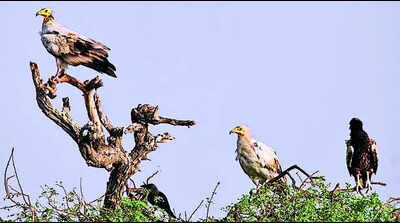- News
- Egyptian vultures fly over 1.6k km to spend winter months in Rajasthan
Egyptian vultures fly over 1.6k km to spend winter months in Rajasthan
Ten GPS-tagged Egyptian vultures from Uzbekistan have reached Rajasthan for winter migration, indicating favorable habitats. The three-year tagging initiative tracks their routes and threats. Experts emphasize the significance for global conservation, despite Rajasthan's exclusion from India's Vulture Conservation Plan.

Dau Lal Bohra, an IUCN member associated with the programme, explained that the initiative, led by the Bulgarian Society for the Protection of Birds, began two years ago to study migration routes and identify threats along the way.
"The vulture tagging programme has been running for three years, during which 13 Egyptian Vultures were tagged between 2022 and 2024. So far, two vultures have reached Barmer, four pairs were spotted in Bikaner, two in Jodhpur, two in Churu, and three migrated to Pakistan. On average, these vultures travelled approximately 1,674 km," Bohra said.
For the first time, these tagged vultures have been located in Redana and Chothan regions of Barmer, as well as in Ramgarh, Churu. Experts noted that this is the second consecutive year these vultures have flown to India. "Last year, they were recorded in Jodhpur, Desert National Park (DNP) in Jaisalmer, and in Jorbeer and Nokha in Bikaner," Bohra said.
Rajasthan has witnessed a strong migration of Egyptian Vultures this year, with nearly 6,000 individuals, including juveniles, arriving. Experts believe this influx of juveniles, making their first migration, is a positive sign for conservation, as the species' global population is in sharp decline. The favourable habitats in Rajasthan are proving suitable for feeding and breeding, they said.
Experts also criticised the exclusion of Rajasthan from the Centre's Action Plan for Vulture Conservation in India (2020-2025), despite its international importance for raptors.
Shradha Vyas, a researcher, said, "Tagging research has shown that raptors from Russia, Kazakhstan, Uzbekistan, Mongolia, and other countries migrate to Rajasthan. However, no specific conservation plan has been prepared. Despite a ban, vultures are still alarmingly affected by two drugs-Aceclofenac and Ketoprofen-administered to cattle by veterinarians. Additionally, many vultures die due to electrocution."
End of Article
FOLLOW US ON SOCIAL MEDIA









